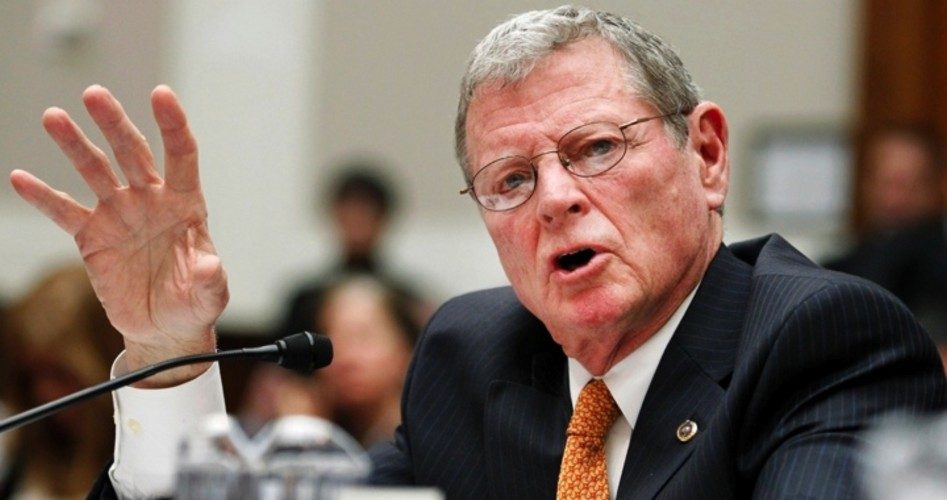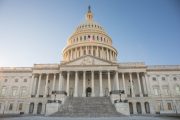
According to Senator James Inhofe (shown, R-Okla.), the Environmental Protection Agency is “playing politics” to protect the interests of the Obama administration, intentionally delaying the implementation of an unpopular mandate until after the midterm elections.
Fox News reports, “The agency’s proposal would impose tough new limits on the amount of carbon dioxide new plants are allowed to emit, essentially requiring any new coal plants to install carbon-capture technology, which critics argue is too expensive.”
Inhofe contends that in order to prevent clashes over the proposed rule coming to a head prior to the midterm elections, the EPA intentionally delayed submitting the rule to the Federal Register.
The Oklahoma senator raised these issues in a letter addressed to EPA administrator Gina McCarthy, wherein he questioned the agency’s decision to submit the rule to the Register on November 25, two months after the proposal was released.
“Based on this sequence of events, it appears that the delay in the proposal’s publication may have been motivated by a desire to lessen the impact of the president’s harmful environmental policies on this year’s midterm elections,” Inhofe wrote.
Inhofe referenced an article in Politico about the delay between releasing the rule and submitting it for the public. Such a move will prohibit Republicans from forcing a vote on repealing the regulation until after the midterms.
It was Politico that observed that newly released documents contradicted claims made by the EPA. The publication also noted:
EPA’s 66-day delay between releasing the rule and submitting it is well out of line with the one- to five-day lags seen in several of the agency’s other hot-button rules in recent years. Still, this is not the first time EPA has been accused of slow-walking regulations for political reasons — Republicans complained about delays in numerous major agency efforts during the 2012 presidential race.
Inhofe observes that the timeline is in direct contrast to assertions made by McCarthy, who claimed that the rule was submitted to the Federal Register “as soon as that proposal was released” to the public on September 20. However, the fact is that the regulation was not submitted until November 25.
“If the rule was finalized by Sept. 20, 2014, the American people would have about six weeks to consider the negative impact of the rule on the economy prior to going to the polls,” Inhofe wrote to McCarthy.
The EPA has attempted to defend the sequence of events by stating that the timeline varies with each rule.
“EPA follows routine interagency and internal processes to ensure that formatting, consistency and quality control issues are addressed before any rule package is published in the Federal Register,” EPA spokeswoman Liz Purchia said. “This is a normal part of the rulemaking process, and the time needed for these procedures varies for each rule.”
Purchia also assigned some blame to the October 1-16 government shutdown, saying the “agency lost a significant amount of time.” But as noted by Politico, that shutdown totaled 11 working days when weekends and Columbus Day are excluded.
Inhofe contends that the EPA intentionally delayed the imposition of the new climate rules, an action he finds “deeply troubling.”
Jahan Wilcox, spokesman for the Republican National Committee, is equally suspicious of the EPA’s timeline, and accuses the agency of “playing politics with their job-killing energy policies.”
“While the EPA thinks they are being cute, voters will see through this political fig leaf aimed at aiding vulnerable Democrats — like Landrieu, Begich, Pryor, Hagan and Walsh — so they later help them enact their radical cap-and-trade agenda,” Wilcox said.
McCarthy countered Inhofe’s assessment, stating,
The delay was solely the backup in the Federal Register office, and we frequently asked when it was going to come out and how quickly, because it was available on our web page. We wanted to start the formal public process.
Upon further investigation, however, it became clear that McCarthy was not telling the truth.
Federal Register Director Charles Barth responded to an inquiry by McCarthy regarding the rule, stating that his office had not even received the rule until November 25.
Ironically, the rule in question was in fact a rewrite of a 2012 draft, a version that had been sent to the Federal Register one day after it was released to the public, and published two weeks later. Critics note that clearly, when the EPA wants to expedite a rule, it can.
Inhofe is now pursuing further investigation to learn just how deep into the administration this decision ran, and to determine the role the Office of Management and Budget played in deciding when to submit the rule.
Inhofe also announced plans to submit all the Obama administration’s environmental legislation to a Congressional Review Act with the intention of curbing costs to the public resulting from new regulations.
In his opening statement, Inhofe observed,
The impacts we’re beginning to see are extremely negative, but the Administration and the EPA do not seem to care. Electricity affordability and reliability clearly have no part in the EPA’s thought process. And this is why I made this commitment yesterday that I am going to have a Congressional Review Act (CRA); I’m going to use that on every one of these regulations…. The people who are elected need to be participating in the process.
Of course, the Congressional Review Act’s record of success is not stellar, as it has only invalidated one regulation since 1996. However, as noted by John Hinderaker with the Powerline Blog, “The CRA could assume new prominence if the GOP captures the Senate in November. The Obama administration gave up on passing legislation long ago, given Republican control of the House, and instead is trying to realize its often-radical goals through agency action.” (Emphasis added.)
Photo of Senator James Inhofe (R-Okla.): AP Images


